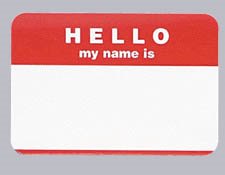Space Invaders
Social networking sites have an amazing gravitational pull. They create a sense of place where geography doesn’t apply. The minute MySpace became the ‘place’ to be, that’s where everyone went and the same has happened with Facebook, Bebo and the rest of them.
There are social pressures to be where other people are, but unsurprisingly, there are also a financial pressures.
The rise of MySpace Music has meant that even the most successful artists feel they need to be there in order to maintain front-of-mind status. U2 are there; Jay Z is there; even Michael Jackson.
Your Space
It only recently occurred to me – when I was typing in these artists’ names in fact – that the rise of these sites does more than just create a focal point. It reopens the name-grabbing market that first came about in the nineties.

When people first started realising the potential in owning a memorable URL, a frenzy ensued. An address like email.com or fish.com were sure to make you a lot of money once the right corporation decided it was a good investment.
They may not have bought any domain names, but lawyers too made a lot of cash helping to settle disputes around a company’s right to own its own domain name. This is interesting in itself as it illustrates a wide acceptance that this digital ‘place’ was significantly public enough that a company should have the right to preserve its established voice there.
So as I started typing www.myspace.com/[insert name here] it occurred to me: this is the domain battle all over again.
So the begging questions were:
(A) What brands will have created a page here?
(B) What are the legal implications of acquiring these names?
McSpace
I’ll start by answering the first question: Not as many as you’d think. But low and behold the first name I typed in – McDonald’s – was indeed there, although not necessarily Lovin’ It.

The “About Me” section details McDonald’s history and the bottom two thirds of the page features messages from some of McDonald’s 4120 “friends”. Reading these messages, you realise very quickly that this is definitely a brand-consumer relationship on the consumer’s terms. Some sample posts:
So it’s not your usual brand relationship and it gets even more disturbing when you read that McDonald’s is a single male, 51 years old and “here for friends”.

I didn’t find many more brands, although it’s worth noting that www.myspace.com/microsoft is Bill Gates’ personal page, rather than a projection of the brand. He also has www.myspace.com/billgates, including the declaration “Steve Jobs is toast!” That kind of comment raises questions about the page's authenticity, but in such an unregulated realm, surely this is just another factor brands have account for.
This page features a video interview with Gates that articulates his interest in having a presence on sites like MySpace in an appropriately non-corporate setting.

So Bill and McDonald’s have their spaces. They recognise that this is a place they need to be. I didn’t find many more, but I did find the pages other mega-brand CEOs may or may not wish they had acquired:
In the world of MySpace, Sony is a single Sagittarian that doesn’t want kids, Nike is 6’2” and doesn’t like sluts and Google is a middle-aged woman who has met Fabio.
My previous post, Brand Behaviour looked at the various ways brands can be personified. The list, it seems, goes on. I just hope no sluts get offended if they see me wearing Nikes.
The Rules
In terms of corporate rights, I imagine brands don’t have much of a leg to stand on. Domain names are public, but MySpace is privately owned. It’s just that its success has made it an incredibly high profile ‘place’.
It’s the digital equivalent of the most popular venue on the planet. McDonald’s presence there is not much different to the company placing ads in a venue in ‘meatspace’ (how apt). Although ‘looking for friends’ in the real world would somehow be even less appropriate.
Will McDonald’s start its own page on Bebo and Facebook? Will Nike release a statement regarding its corporate policy towards loose women? Has Google ever really met Fabio? These are all questions begging to be answered.
Social networking sites are the places Brands are now becoming desperate to be. But like Superman denouncing his powers to live as a mortal (ahem), companies are realising that in order to play in this space, they have to play by the same rules.

They are losing their domain name to teenagers, being abused by a guy in a gasmask and actively ‘looking for friends’.

At this point, you’d expect Newscorp’s Rupert Murdoch to be sitting on top of the pile rubbing his hands together. But it seems this space isn't even totally under his control: http://www.myspace.com/rupertmurdoch
Which raises the question: Just whose space is this?
There are social pressures to be where other people are, but unsurprisingly, there are also a financial pressures.
The rise of MySpace Music has meant that even the most successful artists feel they need to be there in order to maintain front-of-mind status. U2 are there; Jay Z is there; even Michael Jackson.
Your Space
It only recently occurred to me – when I was typing in these artists’ names in fact – that the rise of these sites does more than just create a focal point. It reopens the name-grabbing market that first came about in the nineties.

When people first started realising the potential in owning a memorable URL, a frenzy ensued. An address like email.com or fish.com were sure to make you a lot of money once the right corporation decided it was a good investment.
They may not have bought any domain names, but lawyers too made a lot of cash helping to settle disputes around a company’s right to own its own domain name. This is interesting in itself as it illustrates a wide acceptance that this digital ‘place’ was significantly public enough that a company should have the right to preserve its established voice there.
So as I started typing www.myspace.com/[insert name here] it occurred to me: this is the domain battle all over again.
So the begging questions were:
(A) What brands will have created a page here?
(B) What are the legal implications of acquiring these names?
McSpace
I’ll start by answering the first question: Not as many as you’d think. But low and behold the first name I typed in – McDonald’s – was indeed there, although not necessarily Lovin’ It.

The “About Me” section details McDonald’s history and the bottom two thirds of the page features messages from some of McDonald’s 4120 “friends”. Reading these messages, you realise very quickly that this is definitely a brand-consumer relationship on the consumer’s terms. Some sample posts:
“burgerking aint got shit on you !!!!!!!!!”
“Hey luv ur chicken strips! but damn u guyz are a rip off! Lol”
“cunt flaps i hope u all eat shit”
So it’s not your usual brand relationship and it gets even more disturbing when you read that McDonald’s is a single male, 51 years old and “here for friends”.

I didn’t find many more brands, although it’s worth noting that www.myspace.com/microsoft is Bill Gates’ personal page, rather than a projection of the brand. He also has www.myspace.com/billgates, including the declaration “Steve Jobs is toast!” That kind of comment raises questions about the page's authenticity, but in such an unregulated realm, surely this is just another factor brands have account for.
This page features a video interview with Gates that articulates his interest in having a presence on sites like MySpace in an appropriately non-corporate setting.

So Bill and McDonald’s have their spaces. They recognise that this is a place they need to be. I didn’t find many more, but I did find the pages other mega-brand CEOs may or may not wish they had acquired:
In the world of MySpace, Sony is a single Sagittarian that doesn’t want kids, Nike is 6’2” and doesn’t like sluts and Google is a middle-aged woman who has met Fabio.
My previous post, Brand Behaviour looked at the various ways brands can be personified. The list, it seems, goes on. I just hope no sluts get offended if they see me wearing Nikes.
The Rules
In terms of corporate rights, I imagine brands don’t have much of a leg to stand on. Domain names are public, but MySpace is privately owned. It’s just that its success has made it an incredibly high profile ‘place’.
It’s the digital equivalent of the most popular venue on the planet. McDonald’s presence there is not much different to the company placing ads in a venue in ‘meatspace’ (how apt). Although ‘looking for friends’ in the real world would somehow be even less appropriate.
Will McDonald’s start its own page on Bebo and Facebook? Will Nike release a statement regarding its corporate policy towards loose women? Has Google ever really met Fabio? These are all questions begging to be answered.
Social networking sites are the places Brands are now becoming desperate to be. But like Superman denouncing his powers to live as a mortal (ahem), companies are realising that in order to play in this space, they have to play by the same rules.

They are losing their domain name to teenagers, being abused by a guy in a gasmask and actively ‘looking for friends’.

At this point, you’d expect Newscorp’s Rupert Murdoch to be sitting on top of the pile rubbing his hands together. But it seems this space isn't even totally under his control: http://www.myspace.com/rupertmurdoch
Which raises the question: Just whose space is this?
Labels: domain, marketing, myspace, nothing sacred



2 Comments:
Thanks Michael. I agree but it seems plenty of brands don't. See this link sent to me yesterday:
http://threeminds.organic.com/2006/06/brands_on_myspa.html
This improves on my much-limited research.
Your coupons, Starbuck's offers etc are all very well but these are fairly crude and unintersting (regardless to whether they are successful).
I'm far more interested at the potential compromise of brand image in order to be in a place they cannot fully control. This is surely the most frightening part of new media marketing for these companies. And the most entertaining to witness.
Yes nice post Andy (sorry you had to send me a link to get me over here - been a bit busy!). Just wanted to note re the personality behind the brand being brought to bear that BK have taken it a bit too literally and done a page in the character of their weird+scary King: www.myspace.com/burgerking.
But otherwise I think it's really about two things: 1) how much your biz depends on social networking (as michael points out an auto parts store doesn't necessarily) and 2) to what extent your existing web presence can deliver that.
A sister title of the one I work on has created a myspace page because it has a big tech readership, thrives on community but comes from a big unwieldy B2B publisher whose IT systems don't move fast enough to deliver that.
Post a Comment
Subscribe to Post Comments [Atom]
<< Home